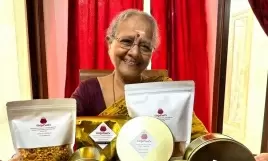How a roadside samosa seller built a Rs 1.5 crore turnover frozen foods venture
11-April-2016
Vol 7 | Issue 15
Not too long ago, J Haja Funyamin sold samosas on the streets of Chennai, but today the 36-year-old is the proprietor of a Rs.1.5 crore turnover company, with ambitious plans for growth and expansion.
His company, Hafa Foods & Frozen Foods, a proprietorship firm, currently has 45 people on its rolls and supplies lip-smacking ready-to-fry samosas and other veg and non-veg delicacies to restaurants, five-star hotels, and flight kitchens.
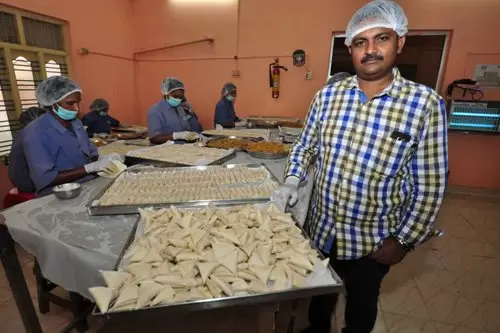 |
|
Haja Funyamin, who rose from humble beginnings, has now set his eyes on increasing production and moving to a larger factory premises (Photos: H K Rajashekar)
|
At their factory cum office in Red Hills on the outskirts of Chennai, we are served hot samosas and veg rolls as Haja goes down the memory lane, recalling his samosa selling days in Pudupet, an area popular for sourcing second hand automobile and two-wheeler spare parts.
His success story is marked by several ups and downs, unexpected twists and turns, making it one heck of an entrepreneurial journey.
Haja’s family lived in Pudupet, and he studied in a Corporation school there.

“We were five siblings and I was the third child. Due to family circumstances, I started selling samosas that my mother made when I was in Class six. I missed classes for days together during Ramzan season when there was great demand for samosas in the evenings.
“I failed in sixth standard three times and finally dropped out of school,” says Haja. But far from being an act of desperation, it was rather a steely resolve to focus on his hitherto part-time work and increase his earnings for the family.
However, for the next five years he was forced to take up small jobs and he worked as a helper in a two-wheeler mechanic shop, as a waiter in a popular restaurant, and as an assistant in a photo studio for low wages.
At 20, he decided to be his own boss and ventured out to set up a chicken pakora shop in Pudupet. So what was his investment like?
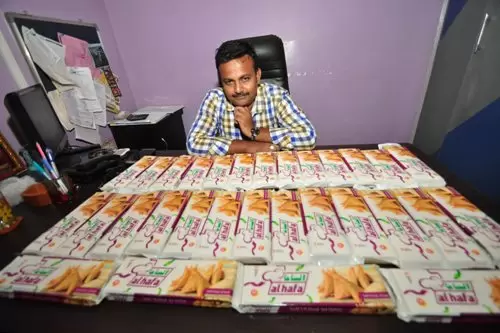 |
|
Haja makes 20 types of ready-to-fry veg and non-veg items
|
“There was nothing of that sort. My shop was on the pavement, so I didn’t need lot of money,” he says with a laugh. “We just needed a stove and some vessels. We could even buy the chicken on credit and pay back at the end of the day from our earnings.”
For two years business was good and he was able to make a profit of about Rs.8,000 every month until the bird flu panic came over the city in 2001. Reports of diseased birds being culled in some countries made the people wary of chicken meat. Chicken sale all over Chennai dropped.
Suddenly, his chicken pakoras that sold like hotcakes wasted on the pans with no takers for them, and dressed chicken waited endlessly for their turn to be fried.
This continued day after day for nearly two months until Haja decided to quit the business after he had accumulated losses close to Rs.40,000.
Eight months later Haja opened a samosa shop in Pudupet vegetable market and this time his recently married wife Farisha, a Class nine dropout, joined him in the business.
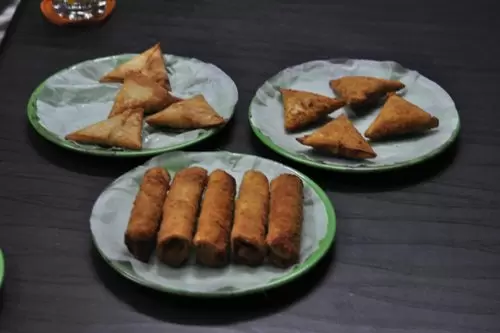 |
“There was no rent for the place. I spent about Rs. 7,000 in setting up the shop and hired an assistant for a salary of Rs. 400,” says Haja.
The shop was open from 4 p.m. till 10 in the night. “In the morning I went around and delivered samosas at 20-30 tea shops located in different parts of the city. Soon, we were selling around Rs.50,000 worth of samosas each month,” says Haja.
In 2006, he got an order from a frozen foods company that changed his life completely. The company’s MD, who was a businessman with interests in different industries, outsourced to him the job of making samosas. The company also provided the required materials – the samosa sheets and stuffings.
“We had to put the stuffings in the samosa sheets and roll them over. We got paid 23 paise per piece. It was a great experience negotiating with such a big businessman, who was bargaining with me over one paisa and two paise on the per piece rate they would be paying us,” says Haja of his former benefactor, who is one of his competitors now.
The samosas would then be frozen, packaged, and exported by the company in a ‘ready-to-fry’ state.
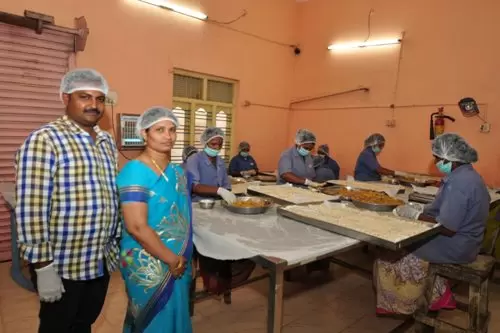 |
|
Haja’s wife Farisha is actively involved in the business and looks after the production in the factory
|
When the deal came through, Haja recruited some local women and started doing the job work from his home. The shop in Pudupet market continued to function.
A year later, the company that had outsourced the samosa rolling work to Haja approached him with a fresh offer. They wanted him to make the sheets, stuffings as well, and then roll them into samosas, and supply in a ‘ready-to-fry’ condition. They required 2 lakh pieces a month.
It was a huge order, but the job required some small machinery which he had to buy, and a larger space to operate from.
Bharatiya Yuva Shakti Trust, a Confederation of Indian Industry (CII) supported project to develop young entrepreneurs, came to his aid by arranging a bank loan of Rs. 1 lakh. Haja organised Rs. 1 lakh from his sources and with this fund he purchased machinery and rented a bigger premises. He hired 10 people for the work.
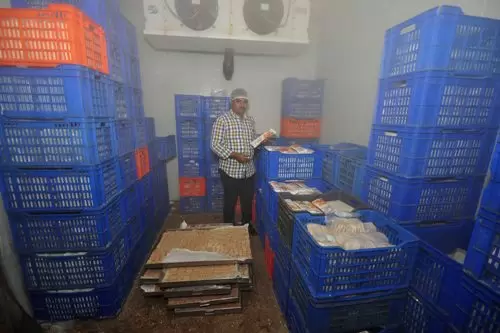 |
|
Haja at the cold storage where food packets are kept until dispatch
|
While he expected the arrangement to last for at least a year, the company stopped the orders abruptly after six months leaving Haja in a tight situation.
The company, which was dealing with other frozen food products as well, had decided to stop the sale of some low value products, and samosas fell in that category.
Haja, who was shaken by this bolt from the blue, was determined to fight it out, though he was clueless on finding a market for his ‘ready-to-fry’ samosas.
However, in an unexpected breakthrough, Haja received a call from a hotel in Chennai, asking if he could supply samosas for them.
“They were buying from the other company, and when they stopped supply, the hotel got in touch with me. It opened my eyes to the market in Chennai. We identified more restaurants in the city and started supplying samosas to them,” says Haja.
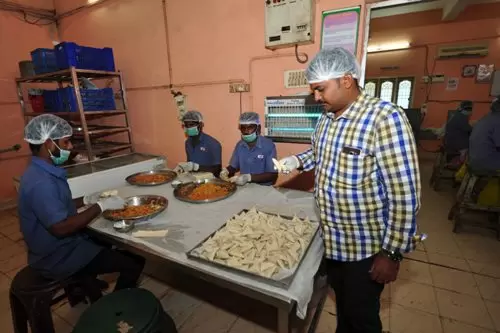 |
|
Haja now heads a 45-strong workforce at Hafa Foods
|
In 2007, they shifted to the present premises in Red Hills, where they are now making about 20 types of ready-to-fry frozen foods including chicken samosa, breaded paneer roll, veg wrap, samosa sheet and chicken cutlet.
Their products are available in many cities in Tamil Nadu, and a few cities like Bengaluru and Mysore in Karnataka, and Vijayawada and Tirupathi in Andhra Pradesh.
“In 2011, our turnover touched Rs.50 lakh. This year we have done Rs.1.5 crore,” says Haja, who is now planning to set up a bigger factory to increase their production capacity.
Haja has two children, a 12-year-old girl and a nine-year-old boy. His wife Farisha looks after production in the factory and handles the accounts.
This Article is Part of the 'Amazing Entrepreneurs' Series
MORE AMAZING ENTREPRENEURS
Supriya Roy, MD, The Sugrarr and Spice
Aasife Ahmed, Founder, Aasife Biryani









